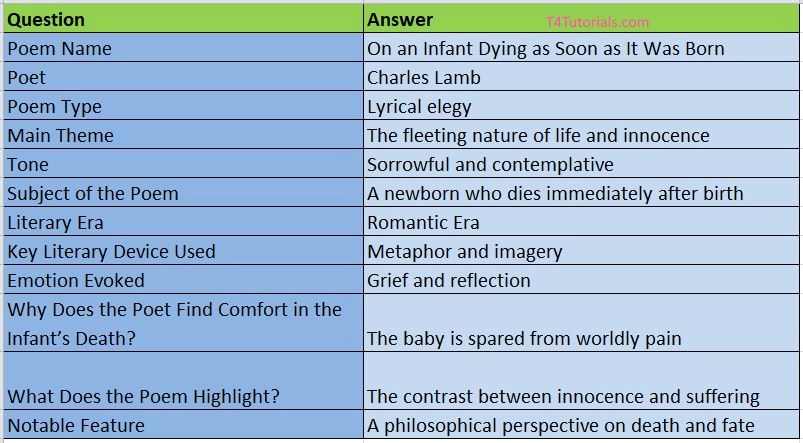Summary:
Charles Lamb’s poem “On an Infant Dying as Soon as It Was Born” is a deeply emotional and philosophical reflection on the brief life of a new born who passes away immediately after birth. The poem explores themes of innocence, fate, and the transient nature of life. Lamb presents the infant’s death as a release from the suffering and struggles of the world, portraying it as a soul untouched by pain or corruption. The tone is both sorrowful and contemplative, as the poet mourns the loss while also finding solace in the thought that the child has been spared from earthly hardships. The poem resonates with a sense of quiet resignation, suggesting that the infant’s short-lived existence might be a merciful escape rather than a tragic loss. It reflects Lamb’s philosophical approach to life and death, blending grief with a sense of divine reasoning.
10
Score: 0
Attempted: 0/10
Subscribe
| Question | Answer |
| Poem Name | On an Infant Dying as Soon as It Was Born |
| Poet | Charles Lamb |
| Poem Type | Lyrical elegy |
| Main Theme | The fleeting nature of life and innocence |
| Tone | Sorrowful and contemplative |
| Subject of the Poem | A newborn who dies immediately after birth |
| Literary Era | Romantic Era |
| Key Literary Device Used | Metaphor and imagery |
| Emotion Evoked | Grief and reflection |
| Why Does the Poet Find Comfort in the Infant’s Death? | The baby is spared from worldly pain |
| What Does the Poem Highlight? | The contrast between innocence and suffering |
| Notable Feature | A philosophical perspective on death and fate |
MCQs & Summary of Some Famous Poems by Charles Lamb
- The Old Familiar Faces – MCQs & Summary
- Hester – MCQs & Summary
- A Farewell to Tobacco – MCQs & Summary
- On an Infant Dying as Soon as It Was Born – MCQs & Summary
- The Grandame – MCQs & Summary
- Blindness – MCQs & Summary
- To Margaret W MCQs & Summary
Famous English Authors MCQs
- William Wordsworth MCQs
- William Shakespeare MCQs
- Robert Browning MCQs
- W B Yeats MCQs
- Edmund Spenser MCQs
- Chaucer MCQs
- John Milton MCQs
- S T Coleridge MCQs
- Lord Byron MCQs
- PB Shelley MCQs
- John Dryden MCQs
- John Keats MCQs
- Charles Dicken MCQs
- Alfred Lord Tennyson MCQs
- Charles Lamb MCQs
- D.H Lawrence MCQs
- Thomas Hardy MCQs
- Matthew Arnold MCQs
- John Galsworthy MCQs
- George Bernard Shaw MCQs
- T.S Eliot MCQs
- Ben Jonson MCQs
- Francis Bacon MCQs
- Alexander Pope MCQs
- Oliver Goldsmith MCQs
- Joseph Addison MCQs
- Dr Samuel Johnson MCQs
- Henry Fielding MCQs
- Sir Walter Scott MCQs
- Jane Austen MCQs
- Dr. Samuel Johnson MCQs
- English Comedy MCQs (Oliver Goldsmith)
- Alexander Pope MCQs (Neo-Classical Age of English Poetry)
- Daniel Defoe MCQs
- Dr. Jonathan Swift MCQs
- Richard Steele MCQs
- English Drama MCQs
- Elizabethan Drama MCQs [14th to 17th century]
- Elizabethan Prose MCQs
More English Literature MCQs
- English Poetry MCQs
- History of English Literature MCQs
- Sentimental Novels MCQs
- Sentimental Poetry MCQs
- Legends Of English Literature MCQs
- English Literature Quiz
- English Literature Important Multiple Choice Questions Answers
- Sons And Lovers by D H Lawrence MCQs
- The Waste Land, A Poem by T. S. Eliot MCQs
- Drama Origin MCQs
- History of the Renaissance Period MCQs
- English Pros MCQs
- Non-Dramtic Poets Of The Elizabethan Age MCQs
- The Cavalier Poets of 17th-century MCQs
- Metaphysical Poets of 17th century MCQs
- Renaissance Period of 14th, 15th, and 16th centuries MCQs
- Puritan Poet MCQs
- Restoration Comedy by William Congreve & Wycherley MCQs
- Satire MCQs – Renaissance Period by John Dryden
- English Essayists MCQs
- Romantic Period of Romantic Poets MCQs
- English language MCQs
- English Humour MCQs [American Literature]
- Early Writers of American Literature MCQs
- History of American Literature MCQs
- American Prose MCQs [English Realism ]
- American English Critics
- New Englanders Authors MCQs
- MCQs on American Literature After Independence
- American Playwrights MCQs
- New American Poetry MCQs
- British English Critics MCQs
- Ancient English literature MCQs
- Important English Literature MCQs for Public Service Commission
- English Literature Repeated Important MCQs
- CSS English Literature MCQs
- History of Early Period MCQs
- The Anglo-Saxon period MCQs
- The Age of Chaucer in the Early Period MCQs
- The Anglo-Norman Period of French Writers MCQs
- Metrical Romances MCQ (Anglo-Saxon Period)
- Revival of Learning MCQs (1400-1550)
- Applied Linguistics MCQs
- Language Change MCQs